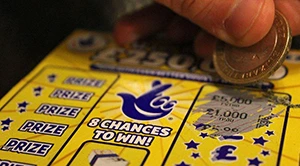 Allwyn UK, the British branch of the international lottery giant Allwyn Group, told PA Media on Monday that as many as 900 British post offices will cease selling lottery tickets and scratchcards in 2024. This news follows last week’s announcement that Allwyn has officially become the new operator of the UK’s National Lottery, making 2024 the first year since the National Lottery’s inauguration in 1994 that it will not be under Camelot’s leadership.
Allwyn UK, the British branch of the international lottery giant Allwyn Group, told PA Media on Monday that as many as 900 British post offices will cease selling lottery tickets and scratchcards in 2024. This news follows last week’s announcement that Allwyn has officially become the new operator of the UK’s National Lottery, making 2024 the first year since the National Lottery’s inauguration in 1994 that it will not be under Camelot’s leadership.
In preparation for the switch, Post Office Limited terminated its group contract with the National Lottery in 2023 and thus made it voluntary for the postmasters of individual branches to stock lottery-related products. According to Post Office Limited, postmasters had asked for this since they wished to earn the entire commission from selling lottery-related products. Prior to this change, the Post Office would charge a roughly 1% fee for any transaction related to the lottery. Moreover, Post Office Limited had, throughout the past year, helped individual branches in various ways with the goal of acclimating them to the new licensing situation.
It seems that for many postmasters, the end result was either neutral or positive, as Andria Vidler, who became CEO of Allwyn UK last October, stressed that the greater number of post office managers have decided to continue selling lottery products under the National Lottery’s new Allwyn licence. She also shared with the PA news agency that retailers saw investment in the British lottery as a way to “get people out.”
Some Postmasters Consider Scratchcards to be the Main Problem
 According to Allwyn, 600 post office managers made the decision to stop stocking lottery tickets and scratchcards due to religious beliefs or unsatisfactory sales, while 200 did not have the option to sign up due to legal reasons, i.e. county court judgments. Calum Greenhow, who serves as chief executive of the National Federation of SubPostmasters (NFSP), specified scratchcards in particular to be the reasoning behind numerous postmasters’ decision to not sign up under the new 10-year licence, however.
According to Allwyn, 600 post office managers made the decision to stop stocking lottery tickets and scratchcards due to religious beliefs or unsatisfactory sales, while 200 did not have the option to sign up due to legal reasons, i.e. county court judgments. Calum Greenhow, who serves as chief executive of the National Federation of SubPostmasters (NFSP), specified scratchcards in particular to be the reasoning behind numerous postmasters’ decision to not sign up under the new 10-year licence, however.
Mr Greenhow gave the Scotland-based post office he runs alongside his wife as an example, as they would have continued to stock and sell lottery tickets if they were not mandated under the UK Gambling Commission’s regulations to also stock up on and sell scratchcards. He continued, clarifying that previously, it was Post Office Limited that covered the costs of scratchcards thanks to the group contract. With that contract no longer in effect, however, it is post office branches that will need to purchase the scratchcards every six weeks. For this to be sufficient, a branch would need to make scratchcard sales amounting to at least £400 per week. Otherwise, they could be facing substantial financial losses from scratchcards that have not been sold. It is this risk that led to Mr Greenhow and his wife deciding against signing up under the new licence, and their worries are shared by many other post office branch managers.
- Author


